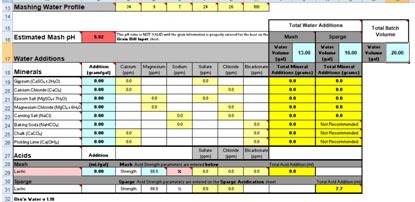My Neighbor down the street is an all grain brewer and he came to the conclusion after much back and forth that he would nee to have each batch of water tested to be sure he knew what he was getting as even when they switch the sources you can get a mix.
I asked my son this am for his take on the Alkalinity and bicarbonate relationship : (now I have to get him to break this down so non-MIT people like me can maybe understand… ) .
On Mon, Aug 7, 2017 at 8:18 AM, <tbrown wrote:
Do you know how total alkalinity relates to bicarbonate in water?
Poland springs analysis gives total alkalinity ( as CaCO3) as a range of 6.1 to 210. Seems like a pretty wide range.
Bru’in water is looking for bicarbonate ( as HCO3) and I have no idea if there is some kind of relationship. I read somewhere that total alkalinity is made up of the sum of 3 carbonates.
Bru’in water seems to calculate the alkalinity.
It would be great to be able to measure this per batch of water if there is an easy test. I test the pool water for alkalinity but it’s prob not the same.
Let me know if you have an idea about this.
Sent from my iPhone
They are the same. Anything that will accept an H+ from water generates an OH- and increases the alkalinity (pH) of the water. The major player is carbonate (CO3) which becomes biocarbonate (HCO3) and carbonic acid (H2CO3). Although to a lesser extent there can be things like phosphates, borates, etc but these are probably not present to any significant amount in the poland spring water.
Carbonate always exists as a salt in solid form (either NaHCO3 sodium bicarbonate or CaCO3 calcium carbonate). When that gets dissolved the Na or Ca go off on their own, and the carbonate or bicarbonate will take some H+ away from the water to stabilize itself, becoming H2CO3 (carbonic acid). It’s more complicated than that because the species exist in an equilibrium, not a complete conversion.
When you measure alkalinity by titration you’re soaking up all of the OH- that was produced by the carbonate (or anything else that might be present) taking H+ away from the water. So you aren’t distinguishing what the source of the carbonate is (CaCO3 vs NaHCO3), you’re just measuring how much carbonate is in the water now. I think it’s pretty safe to assume that all the alkalinity in poland springs water comes from carbonate, so you could probably use the same test and input that number directly.
If this is something I cannot measure easily somehow then my next step will probably be putting in an RO system. Then I won’t need to lug 10 gal of spring water from the grocery store and all the plastic that comes along with it.
